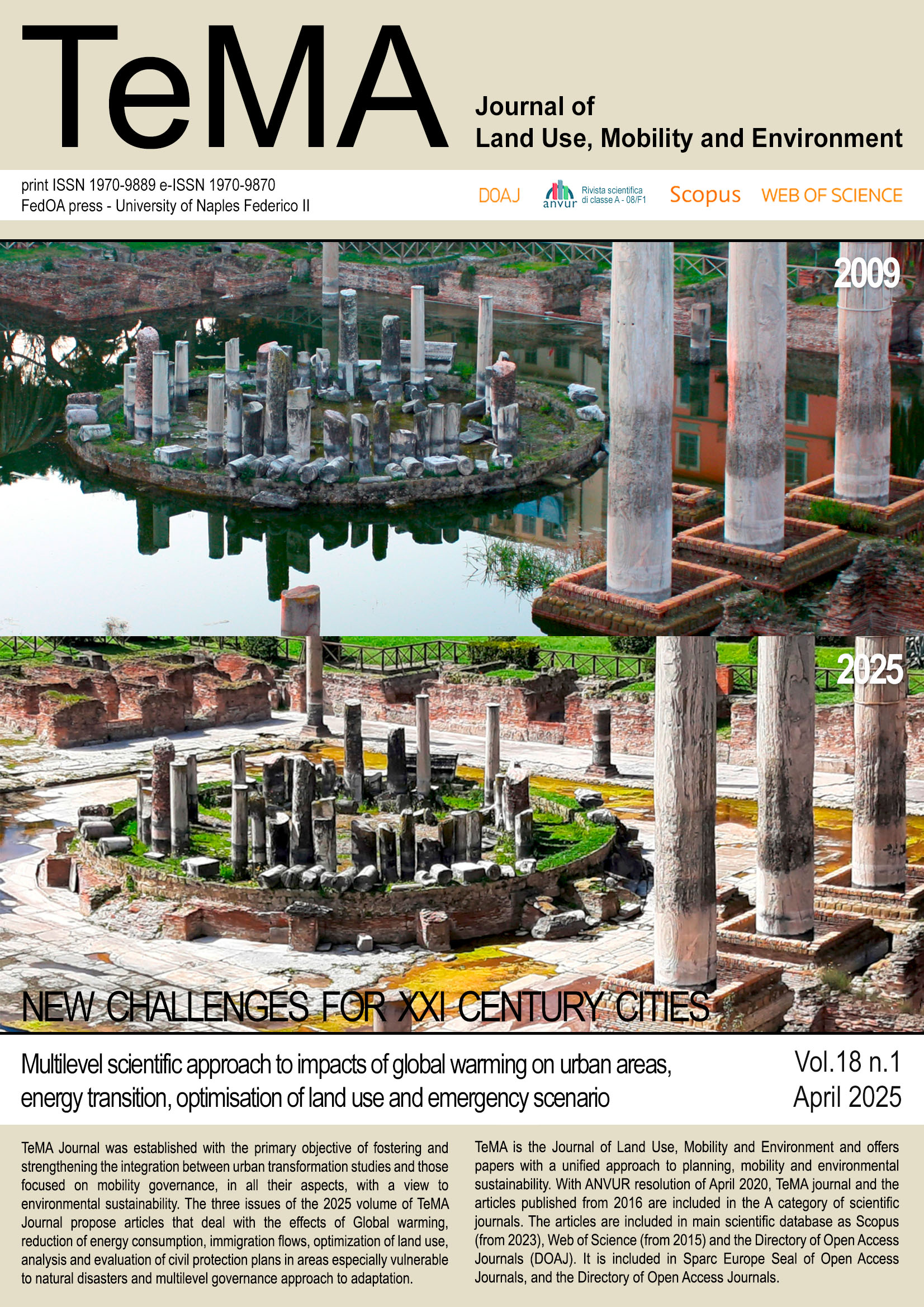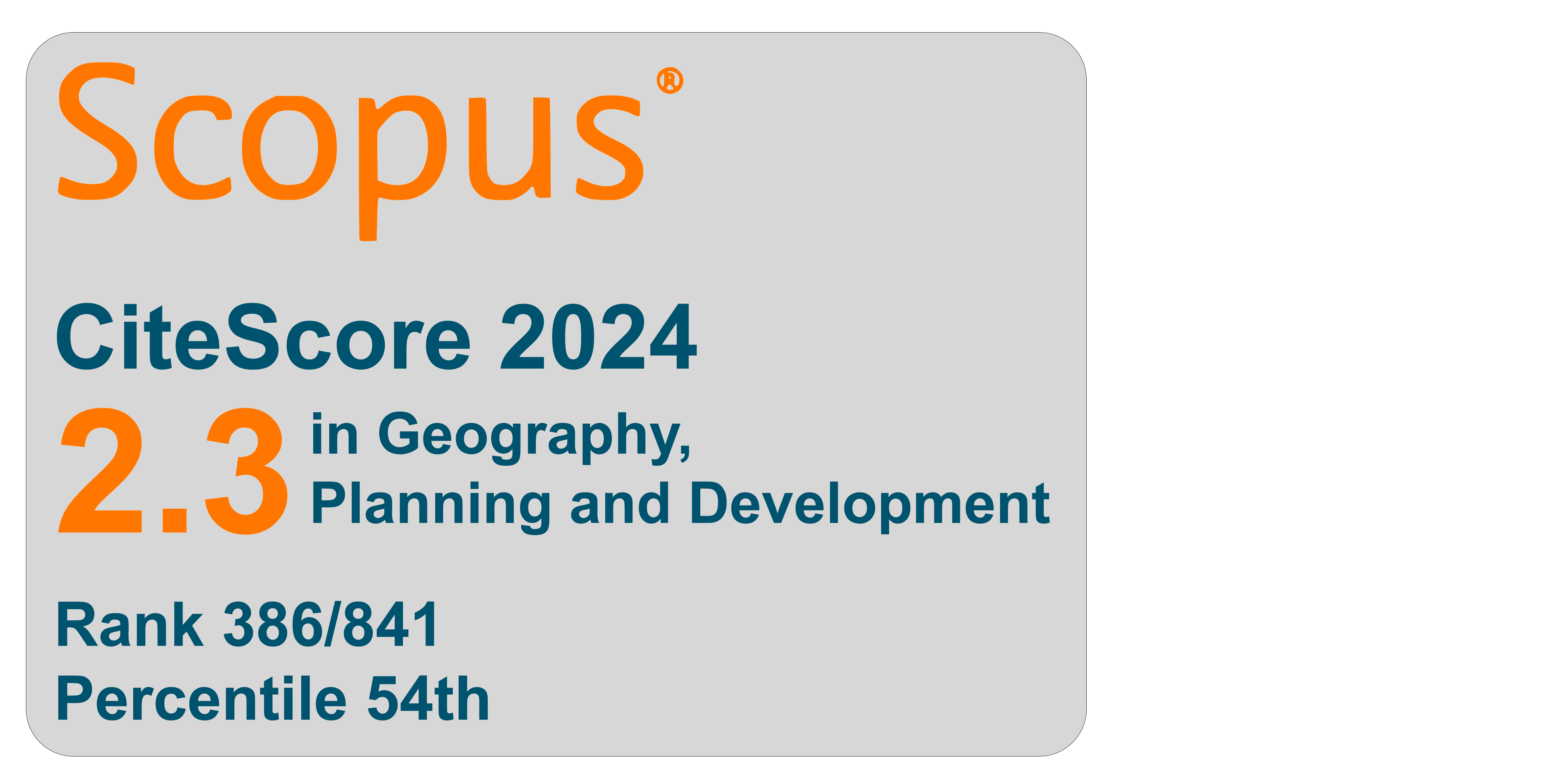Urban energy transition between regulatory evolution and scientific production: a bibliometric analysis
DOI:
https://doi.org/10.6093/1970-9870/11625Keywords:
Energy transition, Urban planning, Regulations, Bibliometric analysisAbstract
Starting from the relationship between urban planning and mobility management, TeMA has gradually expanded the view of the covered topics, always remaining in the groove of rigorous scientific in-depth analysis. This section of the Journal, Review Notes, is the expression of continuously updating emerging topics concerning relationships between urban planning, mobility and environment, through a collection of short scientific papers written by young researchers. The Review Notes are made of four parts. Each section examines a specific aspect of the broader information storage within the main interests of TeMA Journal. This section, International Regulations and Legislation for the Energy Transition, explores the challenges and opportunities in the urban context to understand the evolving landscape of the global energy transition. The contribution explores how scientific research on urban energy transition has evolved alongside European climate policies. It highlights the role of urban governance and planning in supporting decarbonisation through tools like Positive Energy Districts and Renewable Energy Communities. These models integrate innovation with citizen engagement and local energy autonomy. The analysis also reveals how regulatory developments have shaped research priorities. Finally, it underscores the need for stronger coordination to overcome implementation gaps.
Downloads
References
Berghi, S. (2016). Energy planning for Metropolitan Context: Potential and Perspectives of Sustainable Energy Action Plans (SEAPs) of three Italian big cities. Energy Procedia, 101, 1072–1078. https://doi.org/ 10.1016/j.egypro.2016.11.146
Brummer, V. (2018). Community energy – benefits and barriers: A comparative literature review of Community Energy in the UK, Germany and the USA, the benefits it provides for society and the barriers it faces. Renewable and Sustainable Energy Reviews, 94, 187–196. https://doi.org/10.1016/j.rser.2018.06.013
Cruz, C., Alskaif, T., Palomar, E. & Bravo, I. (2023). Prosumers integration in aggregated demand response systems. Energy Policy, 182, 113745. https://doi.org/10.1016/j.enpol.2023.113745
Cumo, F., Maurelli, P., Pennacchia, E. & Rosa, F. (2022). Urban Renewable Energy Communities and Energy Poverty: a proactive approach to energy transition with Sun4All project. IOP Conference Series Earth and Environmental Science, 1073 (1), 012011. https://doi.org/10.1088/1755-1315/1073/1/012011
Derkenbaeva, E., Yoo, H. K., Hofstede, G. J., Galanakis, K. & Ackrill, R. (2022). Positive Energy Districts in Europe: one size does not fit all. 2022 IEEE International Smart Cities Conference (ISC2), 1–6. https://doi.org/10.1109/ isc255366.2022.9921835
Derkenbaeva, E., Hofstede, G. J., Van Leeuwen, E., Vega, S. H. & Wolfers, J. (2024). ENERGY Pro: Spatially explicit agent-based model on achieving positive energy districts. MethodsX, 12, 102779. https://doi.org/10.1016/j.mex.2024.102779
European Commission. (2024). Renewable energy targets. U.S. Department of Energy. https://www.energy.gov/ sites/default/files/2024-06/076.%20European%20Commission%2C%20Renewable%20Energy%20Targets.pdf
Fichera, A., Pluchino, A. & Volpe, R. (2021). Local production and storage in Positive Energy Districts: The Energy Sharing Perspective. Frontiers in Sustainable Cities, 3. https://doi.org/10.3389/frsc.2021.690927
Good, N., Ceseña, E. M., Mancarella, P., Monti, A., Pesch, D. & Ellis, K. (2017). Barriers, challenges, and recommendations related to development of energy positive neighborhoods and smart energy districts. In Elsevier eBooks, 251–274. https://doi.org/10.1016/b978-0-12-809951-3.00008-9
Grafakos, S., Enseñado, E., Flamos, A. & Rotmans, J. (2015). Mapping and measuring European local governments’ priorities for a sustainable and Low-Carbon energy future. Energies, 8 (10), 11641–11666. https://doi.org/10.3390/en81011641
Grignani, A., Gozzellino, M., Sciullo, A. & Padovan, D. (2021). Community Cooperative: a new legal form for enhancing social capital for the development of renewable energy communities in Italy. Energies, 14 (21), 7029. https://doi.org/10.3390 /en14217029
Huang, P., Ma, H. & Liu, Y. (2018). Socio-technical experiments from the bottom-up: The initial stage of solar water heater adoption in a ‘weak’ civil society. Journal of Cleaner Production, 201, 888–895. https://doi.org/10.1016/ j.jclepro.2018.08.087
ISPI. (2022). From the Green Deal to REPowerEU: The green Transition in Europe and beyond. https://www.ispionline.it/en/publication/green-deal-repowereu-green-transition-europe-and-beyond-35902
Knox, S., Hannon, M., Stewart, F. & Ford, R. (2021b). The (in)justices of smart local energy systems: A systematic review, integrated framework, and future research agenda. Energy Research & Social Science, 83, 102333. https://doi.org/10.1016/j.erss.2021.102333
Koutra, S., Terés-Zubiaga, J., Bouillard, P. & Becue, V. (2022). Retracted: Decarbonizing Europe. A critical review on positive energy districts approaches. Sustainable Cities and Society, 89, 104356. https://doi.org/10.1016/j.scs.2022.104356
Mahzouni, A. (2017). Urban brownfield redevelopment and energy transition pathways: A review of planning policies and practices in Freiburg. Journal of Cleaner Production, 195, 1476–1486. https://doi.org/10.1016/j.jclepro.2017.11.116
Margaritopoulos, E. & Xenidis, Y. (2023). Condition-based maintenance using BIM: A case study of energy modeling for a residential building. Journal of Engineering Project and Production Management. https://doi.org/10.32738/jeppm-2023-0024
Mauree, D., Naboni, E., Coccolo, S., Perera, A., Nik, V. M. & Scartezzini, J. (2019). A review of assessment methods for the urban environment and its energy sustainability to guarantee climate adaptation of future cities. Renewable and Sustainable Energy Reviews, 112, 733–746. https://doi.org/10.1016/j.rser.2019.06.005
Moore, J. (2015). Ecological Footprints and Lifestyle Archetypes: Exploring dimensions of consumption and the transformation needed to achieve urban sustainability. Sustainability, 7(4), 4747–4763. https://doi.org/10.3390/su7044747
Musolino, M., Maggio, G., D’Aleo, E. & Nicita, A. (2023). Three case studies to explore relevant features of emerging renewable energy communities in Italy. Renewable Energy, 210, 540–555. https://doi.org/10.1016/j.renene.2023.04.094
Natanian, J., Guarino, F., Manapragada, N., Magyari, A., Naboni, E., De Luca, F., Cellura, S., Brunetti, A. & Reith, A. (2024). Ten questions on tools and methods for positive energy districts. Building and Environment, 255, 111429. https://doi.org/10.1016/j.buildenv.2024.111429
Newton, P. & Newman, P. (2013). The Geography of Solar Photovoltaics (PV) and a new Low Carbon Urban Transition Theory. Sustainability, 5 (6), 2537–2556. https://doi.org/10.3390/su5062537
Proedrou, F. (2023). EU Decarbonization under Geopolitical Pressure: Changing Paradigms and Implications for Energy and Climate Policy. Sustainability, 15 (6), 5083. https://doi.org/10.3390/su15065083
Qin, Z., Yang, H., Shi, L., Ying, O. & Liu, W. (2024). Do smart city policies improve energy efficiency? Evidence from China. Chinese Journal of Population Resources and Environment, 22 (2), 185–193. https://doi.org/10.1016/j.cjpre.2024.06.010
Sæle, H., Sperstad, I. B., Hoiem, K. W. & Mathiesen, V. (2023). Understanding barriers to utilising flexibility in operation and planning of the electricity distribution system – Classification frameworks with applications to Norway. Energy Policy, 180, 113618. https://doi.org/10.1016/j.enpol.2023.113618
Sassenou, L., Olivieri, L. & Olivieri, F. (2023). Challenges for positive energy districts deployment: A systematic review. Renewable and Sustainable Energy Reviews, 191, 114152. https://doi.org/10.1016/j.rser.2023.114152
Segales, M., Hewitt, R. J. & Slee, B. (2023). Social innovation and global citizenship: Guiding principles for sustainable, just and democratic energy transition in cities. Energy Research & Social Science, 106, 103295. https://doi.org/10.1016/ j.erss.2023.103295
Downloads
Published
How to Cite
Issue
Section
License
Copyright (c) 2025 Valerio Martinelli

This work is licensed under a Creative Commons Attribution-NonCommercial 4.0 International License.



